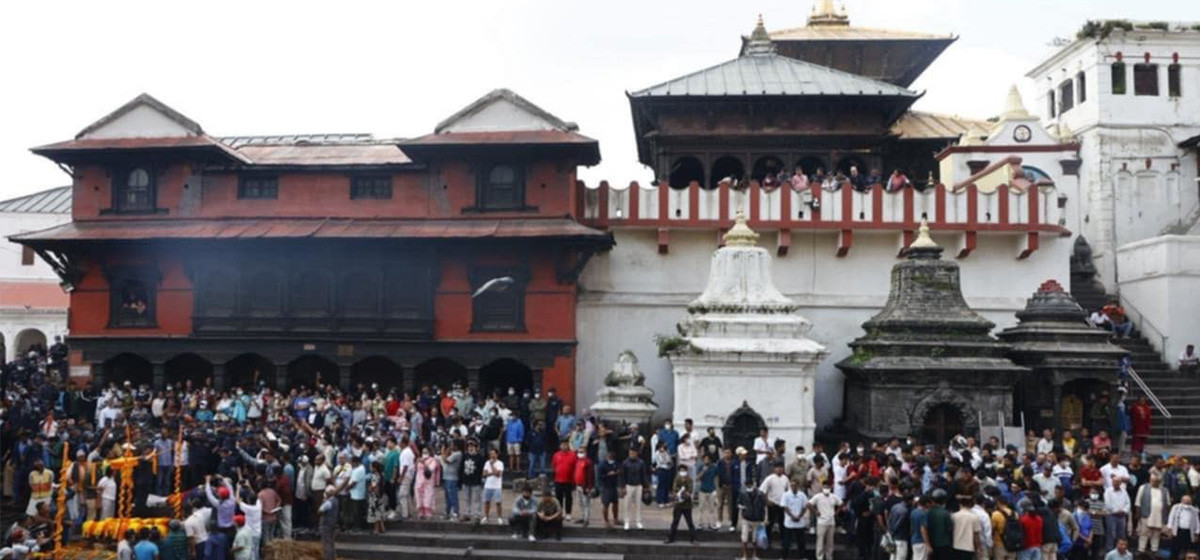KATHMANDU, Sept 13: When those in power stray from the right path, an entire country can be swept away in a torrent of tears—an image that became painfully clear on Friday at Pashupati Aryaghat. On one side of the ghats, the pyres of students who lost their lives during Monday’s Gen-Z protest were burning, while on the other, the pyres of police personnel who were killed during Tuesday’s protests were alight.
Whether it was the burning of 19-year-old Shreeyam Chaulagain, who had joined the movement demanding social media freedom, transparency, and good governance, or the cremation of police personnel who lost their lives in the line of duty, tears flowed unrestrained. It seemed as if, due to the state’s negligence, the entire country, along with the Bagmati River, was weeping. Watching the video of Shreeyam’s pyre, Prabhat Adhikari writes, “He had gone to raise his voice against the country’s injustice; the bullets of those in power silenced him.”
Shreeyam, unaffiliated with any political party and driven only by the welfare of the country, was felled by the bullets of a despotic authority. Yet, even though his voice was silenced, thousands of others like him have risen, Adhikari notes.
The burning of the pyres of police personnel also moved the public deeply. The wailing and crying of their families stirred sorrow in the hearts of all who witnessed it.
Former PM Giri cremated at Pashupati Aryaghat

“We, too, are citizens of this country, like brothers, but following orders is our duty,” one police officer said. “When protests turn violent, our lives are at risk. Today, one of our friends is no longer with us.”
“Due to the corrupt government, both students and police were made to fight each other as enemies,” writes Dinesh Syangtang. “But all those who died are citizens of the same country.”
These are only a few drops in a rising tide of loss. On the first day of the protest, Monday, 19 people were killed during the Gen-Z protest; by Friday, the death toll had risen to 51. When the protest turned violent and the police opened fire to control the crowd, 19 Gen-Z participants were killed, including Shreeyam. On the second day, three police personnel were killed as the protests escalated further.
According to police reports, another 18 people died due to clashes, fires, and stampedes. Of these, 30 Gen-Z participants were killed by gunfire alone. Hundreds were injured. Streets and hospitals were soaked in blood, yet the state, which should have acted to provide a solution, remained largely silent. Only recently has the government moved slowly toward a path of consensus.
Both protesters and police are children of ordinary families, yet political power struggles place them face-to-face, leading to such tragedies.
“At Aryaghat, smoke rose from two pyres at the same time,” writes Anjan Phuyal. “One for a young man’s dream, another for a police officer’s duty.” Families on both sides were in tears. Some carried the bodies of their sons, while others struggled to hold back tears while saluting the police in uniform. In such moments, one question arises: why is the state always so harsh?
The Gen-Z movement reflects the peak of youth dissatisfaction. Yet political parties remain busy blaming each other. Until recently, even Gen-Z protesters were caught in internal blame games. But thanks to their perseverance, they have now come together for the common goal of the country’s prosperity.
The blood spilled on the streets and the grief of police families remain unaddressed. “This incident exposes a bitter truth,” writes Jeewan Aryal. “Political insensitivity forces not only protesters but also security personnel to lose their lives. Both have been used as tools in politics.”
Despite this complex and tense situation, political maneuvering has not stopped. The country now seems to be inching toward a resolution. Youth stress that their demands must be addressed before the anger of the Gen-Z movement escalates further. Ordinary citizens are watching patiently, hoping for a solution.
“The smoke rising from the pyres at Aryaghat is not just for Shreeyam or the police—it is the smoke of the failure of the entire system,” Aryal adds. “If their demands are not addressed meaningfully in time, it will make the whole country weep once again.”




































